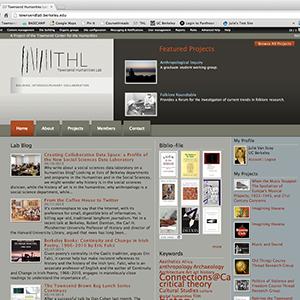Retiring the THL: Looking Back, Looking Forward

Four years ago the Townsend Humanities Lab launched with just a few pilot projects and user tutorials. Since then, the Lab has grown to encompass some 200 projects and over 2000 users. Today, as simpler and more powerful applications like Google's tool suite or Berkeley’s Research Hub arrive on the scene, it has become clear it is no longer resource-efficient to offer a site built in-house. As we prepare to retire the THL, we revisit some of the rich collaborations—from courses to research groups to projects among individual scholars—that have taken place on the site.
The Townsend Humanities Lab was originally developed as an exploration into the ways in which Web 2.0 resources and digital tools could enhance research in the humanities and interpretive social sciences. Teresa Stojkov, Associate Director of the Townsend Center, explained, “When we started, we conceived of the Humanities Lab as a workshop, like an artist’s studio, for predominantly humanities faculty to experiment with digital tools in a safe place, and to encourage collaboration.” It seems faculty were spending lots of time in front of computers, but mainly just writing emails, a pretty primitive form of collaboration. The Lab came into being, in part, to help make those hours in front of the computer more productive.
Anthony J. Cascardi, Dean of Arts and Humanities, was instrumental in the creation of the THL during his tenure as Director of the Townsend Center. He noted that the THL was "a continuation of the Center's basic mission: to help make connections among scholars at Berkeley and beyond, across the interdisciplinary humanities landscape." The Lab, he said, was designed to provide a crucial digital platform for "projects ranging from intercampus discussions of the fate and future of the University, to small interdisciplinary conferences in relatively narrow sub-fields."
Over time, Stojkov said, the constituency of the Lab changed and people became more comfortable with the new digital tools. In addition to providing a space for experimentation, it became integral to a number of campus endeavors like Connections@Cal, seminars for freshmen and sophomores that foster long-term connections between the participants. Connections@Cal used the THL to create an online space for their seminars that would not expire at the end of the term. In his Connections@Cal photography course, Professor Brian Barsky's students posted their work to the THL and received feedback from their professor as well as the other students. Professor Bob Calo also used the THL for his course, "Disengaged: Journalism in an Age of Discord." There, Calo and his students shared links to articles and commented on today's media climate.
Undergraduate Nitisha Patel, a student in the "Imagining Havana" course, which made extensive use of the THL, remembers, "the class' site on the THL gave us a chance to feed off of each other's comments, to get inspiration from others, but still create a complete piece of writing on our own." The online component of the class served as a halfway point between free-flowing class discussion and formal writing.
Professor Catherine Cole and dozens of other group members used the THL for planning and collaborating in the early stages of the massive Fiat Lux project. Their THL project, Making UC Futures, allowed members to plan the project, share pictures and videos, then publicize the related events.
Meanwhile, groups like the interdisciplinary Neurophilosophy Working Group used the THL as a virtual meeting space, allowing those who could not attend the meetings to participate online.
While the THL will retire, the Townsend Center is still committed to fostering innovation and dialogue in the digital humanities. This spring the Center sponsored a Brown Bag Lunch Series on the digital humanities, with Ray Siemens, Marti Hearst and Dan Cohen as guests. A recent conference co-sponsored by the Townsend Center, "What Can the Digital Humanities do for You?", introduced attendees to digital humanities endeavors in numerous disciplines. In addition to future digital humanities programming and funding for related working groups, the Lab Blog and other content from the THL will be migrated to the main Townsend Center web site.
In the larger world of the digital humanities, exciting developments abound. The Lab Blog has been keeping abreast of these innovations from the beginning, from the news of the first Ph.D. program in Digital Humanities to the recent opening of D-Lab, UC Berkeley's new social sciences data laboratory. Asked to comment on the importance of the digital humanities, Dean Cascardi reminds us that the digital humanities are "in fact not a different 'kind' of humanities. The 'digital humanities' is at once a set of tools, a set of practices, and sometimes a set of research questions and teaching possibilities that are created by the new technologies that are all around us." The Townsend Center remains, even without the Lab, deeply engaged with humanistic questions and their digital components.
If you have any questions about the THL retirement, or just want to share your thoughts, please visit the Retiring the THL project.